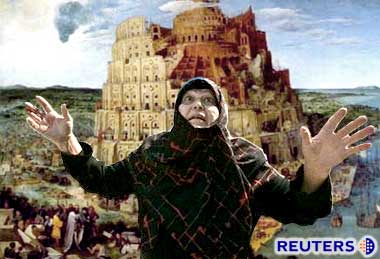
Like the finches of Darwin's Galapagos Islands,
the term "software" has evolved over the years
to represent subtly different things to different people.
Our language does not have 50 different shades
of word for the different species we collectively call "software".
It's as if we used the term "flying things" for Darwin's finches and we didn't comprehend that such imprecise terminology just doesn't quite cut it for serving the needs of a "modern" science-based society.
 And thus, when it comes to the "software" stuff, we are often caught pushing each other
And thus, when it comes to the "software" stuff, we are often caught pushing each other
off the proverbial Tower of Babel as we debate what is and isn't "software"
and whether "it" should be patent eligible.

[still under construction] ....
One writer **here** (a Mr. Martin Goetz) claims that he has the definitive definition of what software is is.
That can be disputed.

Take for example, the “configuration bits” that are loaded into a Field Programmable Gate Array (FPGA). These ones (1's) and zeroes (0's) are not instructions for execution by a “computer” but rather they are controls for how the reconfigurable signal routing wires of the FPGA are to be routed and how the reconfigurable logic blocks of the FPGA are to be configured. It is indeed “software”, but not a kind that is “executed” by a computer. So anyone who claims that all “software” is computer executed software is overstepping the bounds of reasonableness.
By the same token, anyone who claims that all “software” is pure “math” is equally stepping outside the bounds of reasonableness. (Click 'Read More' below to read more.)

We get too emotional when bringing up
the question of "software"
and whether its patenting is the spawn
of the devil's T-word children
(the ones who hide under the bridge).

So let's try on a different question for size:
Should "chemistry" be patent eligible?

What the "H" eeh! double LL does that question mean?
That is the first question that needs to be asked.
Do we mean the "concept" (abstraction) of chemistry?
Do we mean fruits from the useful art known as the practice of chemistry?
Do we mean chemistry as a kind of emotional interaction that may happen between two people?

In other words, we don't know what the "f" (WTF) we are saying to each other when we ask incomprehensible questions like:
1) Should "chemistry" be patent eligible?
2) Should "algorithms" be patent eligible?
3) Should "utilizations of the laws of nature" be patent eligible?
4) Should "specific machines" be patent eligible?
5) Should "IBM's WATSON" be patent eligible?
6) Should ___ be patent eligible?
... where the above includes the equally incomprehensible question of:
7) Should "software" be patent eligible?
(Click on Paul to get your answer.)


No comments:
Post a Comment